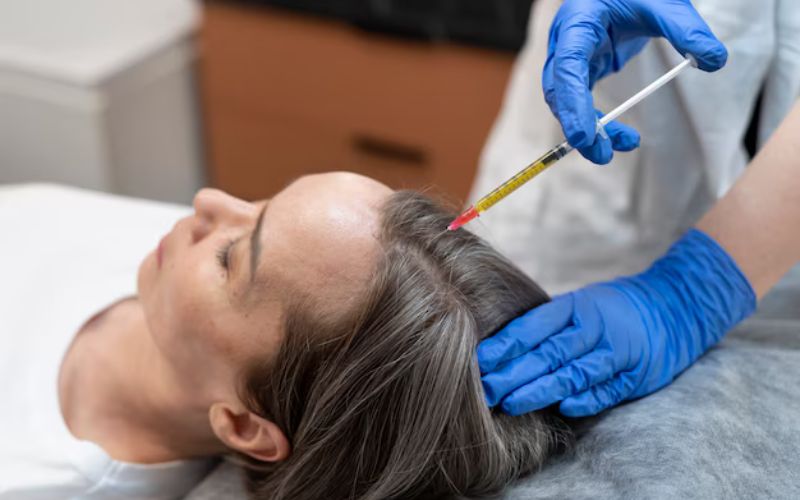Introduction
Hair loss is a common concern that affects millions of people worldwide. While many factors contribute to hair loss, genetics plays a significant role in determining who might experience it and to what extent. Understanding the genetic basis of hair loss can help in managing expectations and seeking appropriate treatments. This blog, brought to you by KJ Aesthetics and Dr. Vishal Brahmabhatt, aims to delve into the genetic factors behind hair loss and is one of the best hair fall doctor in Ahmedabad, particularly for those seeking effective solutions in the city. .
Understanding Hair Loss: The Basics
Before diving into the genetic aspects, it's important to understand the different types of hair loss and their causes. Hair loss, or alopecia, can be categorized into several types:
Androgenetic Alopecia: The most common form of hair loss, often referred to as male-pattern baldness or female-pattern baldness.
Alopecia Areata: An autoimmune condition where the body's immune system attacks hair follicles.
Telogen Effluvium: Temporary hair loss due to stress, illness, or hormonal changes.
Traction Alopecia: Hair loss caused by continuous pulling or tension on hair, often due to hairstyles.
Among these, androgenetic alopecia is most closely linked to genetics.
The Role of Genetics in Hair Loss
The Science Behind Hair Loss
Genes Hair loss genetics are complex and involve multiple genes inherited from both parents. Androgenetic alopecia, the most common form, is primarily influenced by androgens, which are male hormones like testosterone. These hormones affect hair follicles, leading to a gradual shrinkage that eventually results in thinner hair and baldness.
Research indicates that the AR (androgen receptor) gene, located on the X chromosome, plays a pivotal role. Since men inherit one X chromosome from their mother, they are more likely to inherit the gene responsible for male-pattern baldness from their maternal side. However, it's not as simple as inheriting a single gene—multiple genes contribute to the likelihood of hair loss, which is why the pattern and severity can vary greatly even within the same family.
Inheritance Patterns
There is a common belief that hair loss is inherited solely from the mother's side, but this is only partially true. While the AR gene on the X chromosome is significant, other genes on the autosomal chromosomes (non-sex chromosomes) also play a crucial role.
This means that you can inherit hair loss tendencies from both your mother and your father. Studies suggest that if your father experienced significant hair loss, you might be at a higher risk as well. The combination of inherited genes from both parents determines your overall risk for developing androgenetic alopecia.

Myth-Busting: Common Misconceptions About Hair Loss Inheritance
Myth 1: You Only Inherit Hair Loss from Your Mother
As discussed, while the AR gene on the X chromosome from your mother is influential, it's not the only factor. Hair loss is polygenic, meaning it involves multiple genes from both parents.
Myth 2: Hair Loss Skips Generations
There's no scientific evidence to support the idea that hair loss skips generations. If your grandparents or parents have experienced hair loss, you're likely to be at risk as well.
Myth 3: You Can Predict Hair Loss by Looking at Your Relatives
While family history can provide clues, it's not a definitive predictor. The interplay of various genes and environmental factors makes it difficult to predict with certainty who will experience hair loss and to what extent.
How to Determine Your Risk for Genetic Hair Loss
Genetic Testing for Hair Loss
For those concerned about their risk of hair loss, genetic testing can provide valuable insights. Tests can identify specific markers associated with androgenetic alopecia, giving you a better understanding of your potential for hair loss.
Family History
Reviewing your family history can also offer clues. If close relatives on either side of your family have experienced significant hair loss, you may be at higher risk.
Early Signs to Watch For
Receding Hairline: Particularly in men, a receding hairline is often one of the first signs of androgenetic alopecia.
Thinning at the Crown: Both men and women may notice thinning hair at the crown of the head.
Widening Part: Women might observe a widening part as a sign of hair thinning.
Treatment Options for Genetic Hair Loss
Best Hair Fall Treatment in Ahmedabad If you’re in Ahmedabad and concerned about hair loss, KJ Aesthetics offers some of the best hair fall treatments available. Dr. Vishal Brahmabhatt, a leading expert in the field, provides a range of solutions tailored to individual needs.
Medical Treatments
Minoxidil: An FDA-approved topical treatment that can slow hair loss and promote regrowth.
Finasteride: A prescription oral medication that reduces DHT (dihydrotestosterone), a key factor in androgenetic alopecia.
Surgical Options
Hair Transplant Surgery: Involves transplanting hair follicles from areas of dense growth to thinning or balding areas.
Scalp Micropigmentation: A cosmetic procedure that creates the illusion of fuller hair through scalp tattooing.
Lifestyle and Home Remedies
Diet and Nutrition: A diet rich in vitamins and minerals, such as biotin, zinc, and iron, can support healthy hair.
Stress Management: Since stress can exacerbate hair loss, managing stress through practices like yoga and meditation can be beneficial.
Proper Hair Care: Gentle hair care practices, including avoiding tight hairstyles and harsh chemicals, can help preserve hair health.
Frequently Asked Questions (FAQ)
Hair loss can be caused by various factors, including genetics, hormonal changes, medical conditions, medications, and stress. Androgenetic alopecia, or pattern baldness, is the most common cause and is largely influenced by genetics.
Conclusion
Genetic hair loss can be a challenging condition, but understanding the role of genetics can help you take proactive steps. Whether through lifestyle changes, medical treatments, or surgical options, there are effective ways to manage and treat hair loss. For those in Ahmedabad, KJ Aesthetics and Dr. Vishal Brahmabhatt offer some of the best solutions available, ensuring you receive expert care tailored to your needs.
Remember, while genetics plays a significant role in hair loss, it's not the only factor. By staying informed and seeking the right treatment, you can manage hair loss effectively and maintain your confidence.

